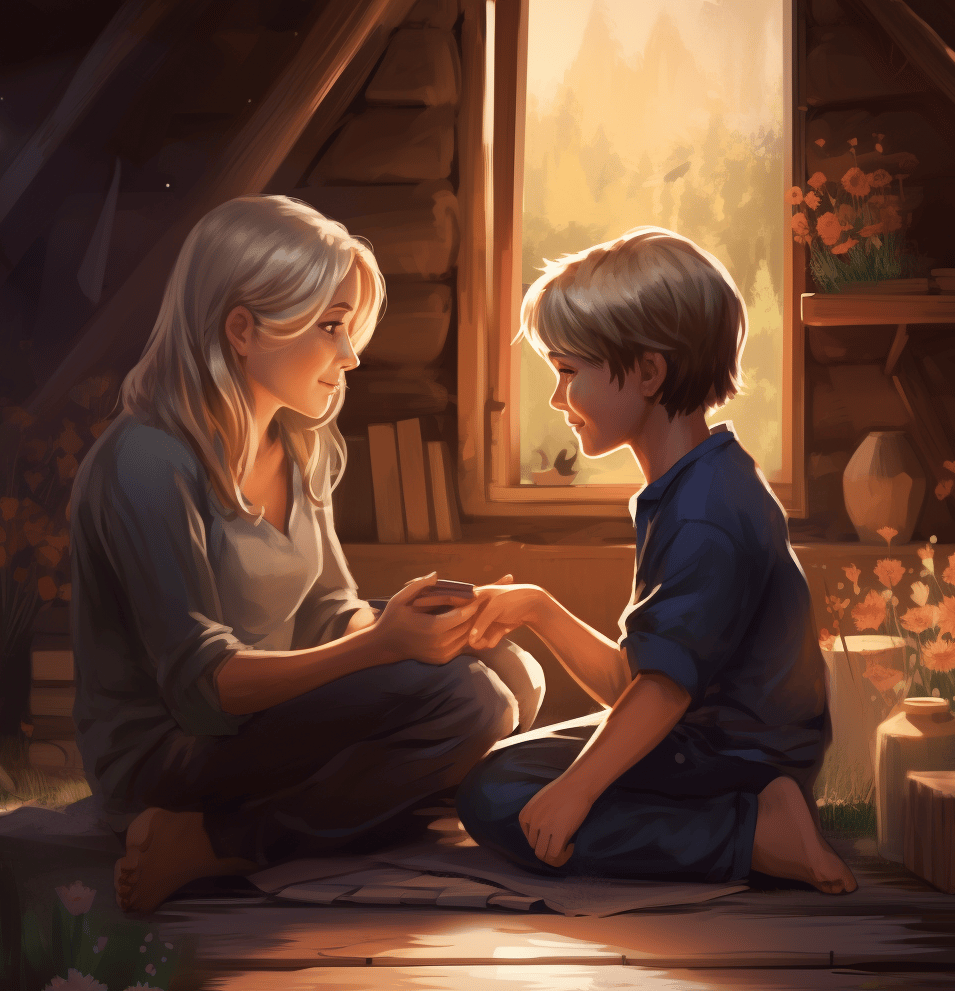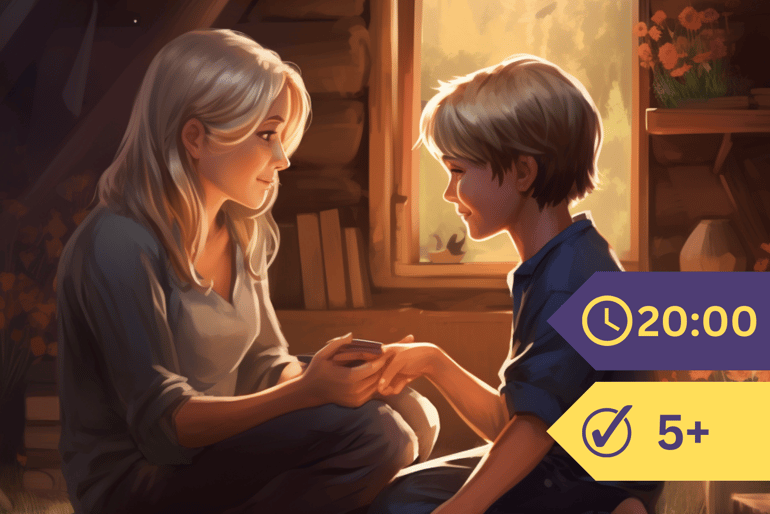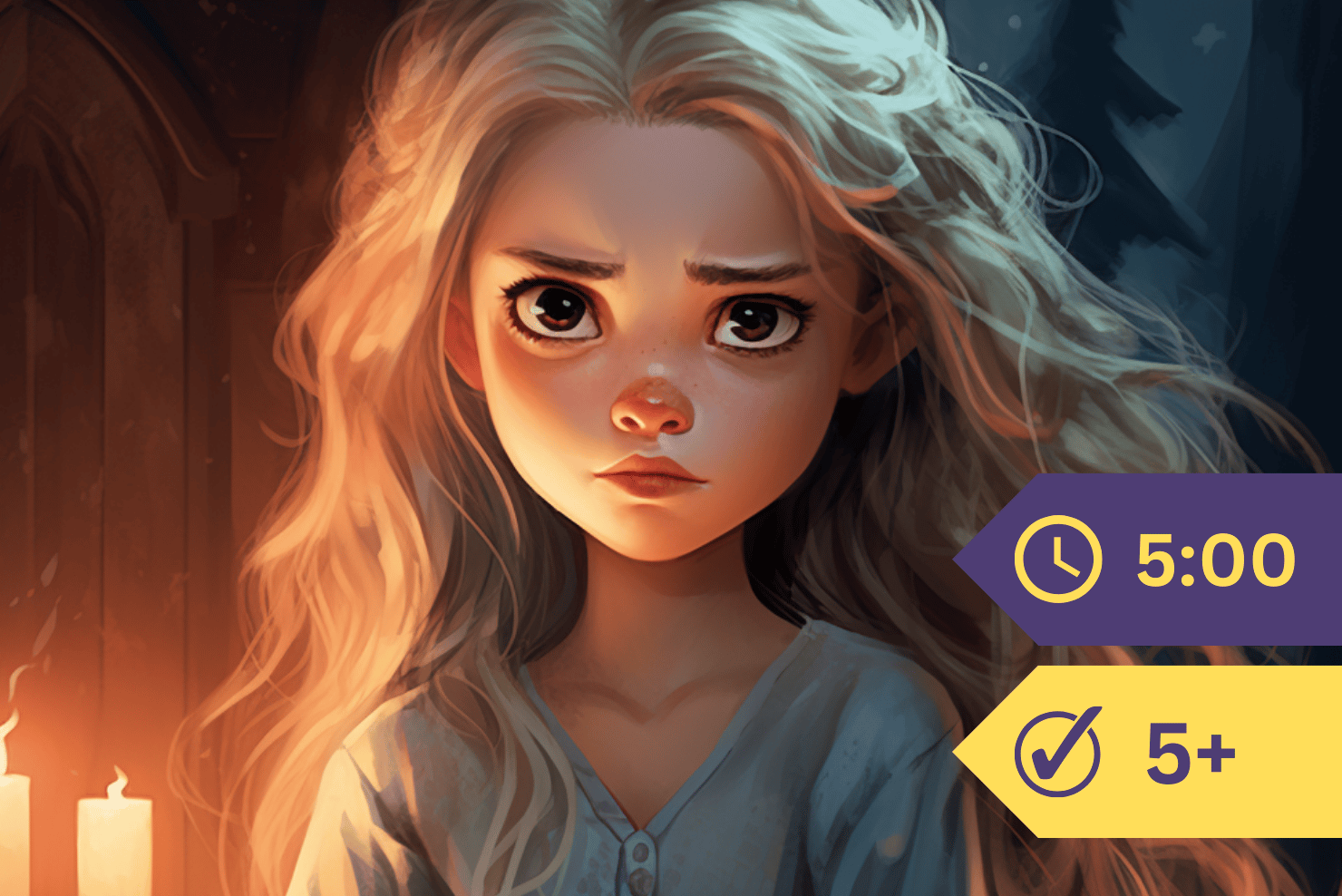Curdie went up the mountain neither whistling nor singing, for he was vexed with Irene for taking him in, as he called it; and he was vexed with himself for having spoken to her so angrily. His mother gave a cry of joy when she saw him, and at once set about getting him something to eat, asking him questions all the time, which he did not answer so cheerfully as usual. When his meal was ready, she left him to eat it, and hurried to the mine to let his father know he was safe. When she came back, she found him fast asleep upon her bed; nor did he wake until his father came home in the evening.
‘Now, Curdie,’ his mother said, as they sat at supper, ‘tell us the whole story from beginning to end, just as it all happened.’
Curdie obeyed, and told everything to the point where they came out upon the lawn in the garden of the king’s house.
‘And what happened after that?’ asked his mother. ‘You haven’t told us all. You ought to be very happy at having got away from those demons, and instead of that I never saw you so gloomy. There must be something more. Besides, you do not speak of that lovely child as I should like to hear you. She saved your life at the risk of her own, and yet somehow you don’t seem to think much of it.’
‘She talked such nonsense’ answered Curdie, ‘and told me a pack of things that weren’t a bit true; and I can’t get over it.’
‘What were they?’ asked his father. ‘Your mother may be able to throw some light upon them.’
Then Curdie made a clean breast of it, and told them everything.
They all sat silent for some time, pondering the strange tale. At last Curdie’s mother spoke.
‘You confess, my boy,’ she said, ‘there is something about the whole affair you do not understand?’
‘Yes, of course, mother,’ he answered. ‘I cannot understand how a child knowing nothing about the mountain, or even that I was shut up in it, should come all that way alone, straight to where I was; and then, after getting me out of the hole, lead me out of the mountain too, where I should not have known a step of the way if it had been as light as in the open air.’
‘Then you have no right to say what she told you was not true. She did take you out, and she must have had something to guide her: why not a thread as well as a rope, or anything else? There is something you cannot explain, and her explanation may be the right one.’
‘It’s no explanation at all, mother; and I can’t believe it.’
‘That may be only because you do not understand it. If you did, you would probably find it was an explanation, and believe it thoroughly. I don’t blame you for not being able to believe it, but I do blame you for fancying such a child would try to deceive you. Why should she? Depend upon it, she told you all she knew. Until you had found a better way of accounting for it all, you might at least have been more sparing of your judgement.’
‘That is what something inside me has been saying all the time,’ said Curdie, hanging down his head. ‘But what do you make of the grandmother? That is what I can’t get over. To take me up to an old garret, and try to persuade me against the sight of my own eyes that it was a beautiful room, with blue walls and silver stars, and no end of things in it, when there was nothing there but an old tub and a withered apple and a heap of straw and a sunbeam! It was too bad! She might have had some old woman there at least to pass for her precious grandmother!’
‘Didn’t she speak as if she saw those other things herself, Curdie?’
‘Yes. That’s what bothers me. You would have thought she really meant and believed that she saw every one of the things she talked about. And not one of them there! It was too bad, I say.’
‘Perhaps some people can see things other people can’t see, Curdie,’ said his mother very gravely. ‘I think I will tell you something I saw myself once—only Perhaps You won’t believe me either!’
‘Oh, mother, mother!’ cried Curdie, bursting into tears; ‘I don’t deserve that, surely!’
‘But what I am going to tell you is very strange,’ persisted his mother; ‘and if having heard it you were to say I must have been dreaming, I don’t know that I should have any right to be vexed with you, though I know at least that I was not asleep.’
‘Do tell me, mother. Perhaps it will help me to think better of the princess.’
‘That’s why I am tempted to tell you,’ replied his mother. ‘But first, I may as well mention that, according to old whispers, there is something more than common about the king’s family; and the queen was of the same blood, for they were cousins of some degree. There were strange stories told concerning them—all good stories—but strange, very strange. What they were I cannot tell, for I only remember the faces of my grandmother and my mother as they talked together about them. There was wonder and awe—not fear—in their eyes, and they whispered, and never spoke aloud. But what I saw myself was this: Your father was going to work in the mine one night, and I had been down with his supper. It was soon after we were married, and not very long before you were born. He came with me to the mouth of the mine, and left me to go home alone, for I knew the way almost as well as the floor of our own cottage. It was pretty dark, and in some parts of the road where the rocks overhung nearly quite dark. But I got along perfectly well, never thinking of being afraid, until I reached a spot you know well enough, Curdie, where the path has to make a sharp turn out of the way of a great rock on the left-hand side. When I got there, I was suddenly surrounded by about half a dozen of the cobs, the first I had ever seen, although I had heard tell of them often enough. One of them blocked up the path, and they all began tormenting and teasing me in a way it makes me shudder to think of even now.’
‘If I had only been with you!’ cried father and son in a breath.
The mother gave a funny little smile, and went on.
‘They had some of their horrible creatures with them too, and I must confess I was dreadfully frightened. They had torn my clothes very much, and I was afraid they were going to tear myself to pieces, when suddenly a great white soft light shone upon me. I looked up. A broad ray, like a shining road, came down from a large globe of silvery light, not very high up, indeed not quite so high as the horizon—so it could not have been a new star or another moon or anything of that sort. The cobs dropped persecuting me, and looked dazed, and I thought they were going to run away, but presently they began again. The same moment, however, down the path from the globe of light came a bird, shining like silver in the sun. It gave a few rapid flaps first, and then, with its wings straight out, shot, sliding down the slope of the light. It looked to me just like a white pigeon. But whatever it was, when the cobs caught sight of it coming straight down upon them, they took to their heels and scampered away across the mountain, leaving me safe, only much frightened. As soon as it had sent them off, the bird went gliding again up the light, and the moment it reached the globe the light disappeared, just as if a shutter had been closed over a window, and I saw it no More. But I had no more trouble with the cobs that night or ever after.’

‘How strange!’ exclaimed Curdie.
‘Yes, it was strange; but I can’t help believing it, whether you do or not,’ said his mother.
‘It’s exactly as your mother told it to me the very next morning,’ said his father.
‘You don’t think I’m doubting my own mother?’ cried Curdie. ‘There are other people in the world quite as well worth believing as your own mother,’ said his mother. ‘I don’t know that she’s so much the fitter to be believed that she happens to be your mother, Mr. Curdie. There are mothers far more likely to tell lies than the little girl I saw talking to the primroses a few weeks ago. If she were to lie I should begin to doubt my own word.’
‘But princesses have told lies as well as other people,’ said Curdie.
‘Yes, but not princesses like that child. She’s a good girl, I am certain, and that’s more than being a princess. Depend upon it you will have to be sorry for behaving so to her, Curdie. You ought at least to have held your tongue.’
‘I am sorry now,’ answered Curdie.
‘You ought to go and tell her so, then.’
‘I don’t see how I could manage that. They wouldn’t let a miner boy like me have a word with her alone; and I couldn’t tell her before that nurse of hers. She’d be asking ever so many questions, and I don’t know how many the little princess would like me to answer. She told me that Lootie didn’t know anything about her coming to get me out of the mountain. I am certain she would have prevented her somehow if she had known it. But I may have a chance before long, and meantime I must try to do something for her. I think, father, I have got on the track at last.’
‘Have you, indeed, my boy?’ said Peter. ‘I am sure you deserve some success; you have worked very hard for it. What have you found out?’
‘It’s difficult, you know, father, inside the mountain, especially in the dark, and not knowing what turns you have taken, to tell the lie of things outside.’
‘Impossible, my boy, without a chart, or at least a compass,’ returned his father.
‘Well, I think I have nearly discovered in what direction the cobs are mining. If I am right, I know something else that I can put to it, and then one and one will make three.’
‘They very often do, Curdie, as we miners ought to be very well aware. Now tell us, my boy, what the two things are, and see whether we can guess at the same third as you.’
‘I don’t see what that has to do with the princess,’ interposed his mother.
‘I will soon let you see that, mother. Perhaps you may think me foolish, but until I am sure there, is nothing in my present fancy, I am more determined than ever to go on with my observations. Just as we came to the channel by which we got out, I heard the miners at work somewhere near—I think down below us. Now since I began to watch them, they have mined a good half-mile, in a straight line; and so far as I am aware, they are working in no other part of the mountain. But I never could tell in what direction they were going. When we came out in the king’s garden, however, I thought at once whether it was possible they were working towards the king’s house; and what I want to do tonight is to make sure whether they are or not. I will take a light with me—’
‘Oh, Curdie,’ cried his mother, ‘then they will see you.’
‘I’m no more afraid of them now than I was before,’ rejoined Curdie, ‘now that I’ve got this precious shoe. They can’t make another such in a hurry, and one bare foot will do for my purpose. Woman as she may be, I won’t spare her next time. But I shall be careful with my light, for I don’t want them to see me. I won’t stick it in my hat.’
‘Go on, then, and tell us what you mean to do.’
‘I mean to take a bit of paper with me and a pencil, and go in at the mouth of the stream by which we came out. I shall mark on the paper as near as I can the angle of every turning I take until I find the cobs at work, and so get a good idea in what direction they are going. If it should prove to be nearly parallel with the stream, I shall know it is towards the king’s house they are working.’
‘And what if you should? How much wiser will you be then?’
‘Wait a minute, mother dear. I told you that when I came upon the royal family in the cave, they were talking of their prince—Harelip, they called him—marrying a sun-woman—that means one of us—one with toes to her feet. Now in the speech one of them made that night at their great gathering, of which I heard only a part, he said that peace would be secured for a generation at least by the pledge the prince would hold for the good behaviour of her relatives: that’s what he said, and he must have meant the sun-woman the prince was to marry. I am quite sure the king is much too proud to wish his son to marry any but a princess, and much too knowing to fancy that his having a peasant woman for a wife would be of any great advantage to them.’
‘I see what you are driving at now,’ said his mother.
‘But,’ said his father, ‘our king would dig the mountain to the plain before he would have his princess the wife of a cob, if he were ten times a prince.’
‘Yes; but they think so much of themselves!’ said his mother. ‘Small creatures always do. The bantam is the proudest cock in my little yard.’
‘And I fancy,’ said Curdie, ‘if they once got her, they would tell the king they would kill her except he consented to the marriage.’
‘They might say so,’ said his father, ‘but they wouldn’t kill her; they would keep her alive for the sake of the hold it gave them over our king. Whatever he did to them, they would threaten to do the same to the princess.’
‘And they are bad enough to torment her just for their own amusement—I know that,’ said his mother.
‘Anyhow, I will keep a watch on them, and see what they are up to,’ said Curdie. ‘It’s too horrible to think of. I daren’t let myself do it. But they shan’t have her—at least if I can help it. So, mother dear—my clue is all right—will you get me a bit of paper and a pencil and a lump of pease pudding, and I will set out at once. I saw a place where I can climb over the wall of the garden quite easily.’
‘You must mind and keep out of the way of the men on the watch,’ said his mother.
‘That I will. I don’t want them to know anything about it. They would spoil it all. The cobs would only try some other plan—they are such obstinate creatures! I shall take good care, mother. They won’t kill and eat me either, if they should come upon me. So you needn’t mind them.’
His mother got him what he had asked for, and Curdie set out. Close beside the door by which the princess left the garden for the mountain stood a great rock, and by climbing it Curdie got over the wall. He tied his clue to a stone just inside the channel of the stream, and took his pickaxe with him. He had not gone far before he encountered a horrid creature coming towards the mouth. The spot was too narrow for two of almost any size or shape, and besides Curdie had no wish to let the creature pass. Not being able to use his pickaxe, however, he had a severe struggle with him, and it was only after receiving many bites, some of them bad, that he succeeded in killing him with his pocket-knife. Having dragged him out, he made haste to get in again before another should stop up the way.
I need not follow him farther in this night’s adventures. He returned to his breakfast, satisfied that the goblins were mining in the direction of the palace—on so low a level that their intention must, he thought, be to burrow under the walls of the king’s house, and rise up inside it—in order, he fully believed, to lay hands on the little princess, and carry her off for a wife to their horrid Harelip.


